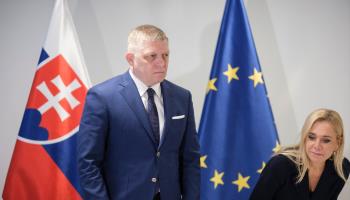The EU is considering a veto-proof measure to end all gas imports from Russia but it is legally controversial
Next month the European Council will vote on a legislative proposal to end the import of Russian gas completely by the end of 2027. It provides for the abolition of contracts over 2026-27, import-pipeline monitoring to ensure compliance and for states to produce impact and diversification plans. However, key aspects are open to legal challenge and the ban is less absolute than claimed.
What’s next
The proposal will likely be approved as it does not require unanimity. Breaking existing contracts will be controversial and the use of force majeure clauses could leave buyers exposed to legal challenge. Slovakia has pushed back hard and will demand EU support if it suffers from higher prices or is taken to court by Gazprom. The policy could fail should litigation proliferate, or member states resist compliance.
Subsidiary Impacts
- Russian revenues from gas sales to Europe are already tiny and unlikely to be affected by any EU measures.
- Monitoring provisions extend the Commission’s reach but risk creating new bureaucratic burdens and political disagreements.
- National Diversification Plans risk either exposing contradictions in EU energy security strategy or generating perfunctory compliance.
Analysis
Since Russia’s invasion of Ukraine, the European Commission has pressed for a reduction in imports of Russian energy. Sanctions on oil and coal were implemented relatively swiftly, but gas was excepted given residual dependence in several east-central European states.
The continuation of the conflict into 2025 has prompted the Commission to advance a new initiative. On May 6, it proposed a “Roadmap towards ending Russian energy imports”, which became a legislative proposal on June 17. The European Parliament will vote on it in October.
Generally, EU sanctions require unanimity. This proposal requires only a qualified majority, sidestepping likely vetoes from Hungary, Slovakia and potentially Austria.
Core elements
The proposed legislation rests on three pillars: termination of contracts; a monitoring regime; and National Diversification Plans (NDPs).
Regarding contracts, the legislation aims for a phased exit:
- Short-term contracts (up to twelve months) signed after June 17, 2025 must be ended by January 1, 2026.
- Short-term contracts signed before the June 17 cut-off date must terminate by June 17, 2026.
- Contracts of longer duration signed before June 17, 2025 and not subsequently amended must end by January 1, 2028.
- Long-term liquefied natural gas (LNG) services for Russian entities, including storage and re-gasification, are prohibited from January 2026. This effectively bans Russian LNG imports.
Regarding monitoring, there are three main provisions:
- Importers must provide contract details (excluding price) for both pipeline gas and LNG.
- Gas flows through 16 named interconnection points will be presumed Russian in origin unless buyers prove otherwise.
- Regulators may demand information on “suspicious” flows to verify compliance.
Finally, to advance diversification, member states must submit NDPs by March 1, 2026 outlining:
- timescales for eliminating Russian gas;
- security of supply assessments and internal market impacts; and
- additional steps for phasing out Russian oil.
An emergency derogation allows the temporary suspension of the ban if supply security is at risk.
Contractual disputes and force majeure
The central challenge lies in the treatment of long-term supply contracts, notably with Gazprom and LNG suppliers such as Novatek. Ordinarily, contractual renegotiation would enable phased reductions. However, the EU’s framework prohibits amendments, requiring abrupt termination. The Commission argues that its legislation qualifies as a “force majeure” event, allowing contracts to be ended without penalty.
This interpretation is highly contested. Force majeure clauses vary significantly across contracts. Some include government action, others do not. Moreover, courts may view the ban as insufficiently “unexpected”: the war has persisted for three years, and the EU signalled such measures as early as 2022. Tribunals could rule that buyers should have prepared, thereby rejecting force majeure claims. Outcomes will differ across jurisdictions, heightening legal uncertainty.
The risk of successful litigation is substantial. Penalties could be severe, particularly for Slovakia, which maintains a Gazprom contract until 2034. Bratislava has already demanded EU guarantees against higher costs, supply shortfalls or adverse legal judgments (see SLOVAKIA: Two-track energy policy will be pursued – August 18, 2025). Prime Minister Robert Fico blocked approval of the EU’s 18th sanctions package until Commission President Ursula von der Leyen assured him in writing of EU support. Hungary and Austria may raise similar demands. Without legal certainty, member states risk exposure to costly arbitration, undermining both solidarity and credibility.
Even if accepted, force majeure does not necessarily imply permanent contract termination. It suspends obligations during extraordinary events. If conditions change — for instance, the war ends and EU policy shifts — contracts could theoretically be revived. This introduces an additional layer of ambiguity over whether the ban represents a final severing of ties or a temporary disruption.
Regulatory oversight and transparency challenges
The proposed monitoring framework greatly expands the Commission’s regulatory authority. Contractual transparency requirements oblige companies to disclose extensive details, increasing administrative burdens and raising concerns over commercial confidentiality.
The identification of 16 interconnection points as presumed Russian entry routes is especially contentious. Gas molecules are indistinguishable, and flows through Turkey or Serbia may combine Russian, Azerbaijani, Qatari (LNG) or even new Turkish Black Sea production. Demanding “unambiguous evidence” risks detaining legitimate cargoes at EU borders if documentation is inconclusive. This could deter suppliers and strain relations with transit states.
Notably, the Ukrainian corridor is excluded from the list of identified points. Currently dormant — the transit contract expired in 2024 — it could theoretically be reactivated post-war (see RUSSIA: Gas sales to the EU will struggle to rebound – March 31, 2025). This omission suggests that Brussels is leaving open the possibility of renewed Ukrainian transit under different political circumstances. Thus, the ambition of a permanent and unconditional ban is less absolute than the rhetoric implies.
Political and economic dilemmas of diversification
The requirement for member states to prepare NDPs further deepens potential divisions. Governments must outline replacement strategies, security implications and market effects. However, the exercise may expose contradictions.
For some states, Russian gas volumes are now marginal and diversification is already achieved (see EASTERN EUROPE: Russian gas cut-off forces rethink – January 14, 2025 and see RUSSIA: EU will struggle to end all energy imports – May 7, 2025). Others, particularly in Central Europe, still face significant exposure. Drafting NDPs could therefore highlight inequalities, reinforcing demands for financial or infrastructural support from the EU budget.
The process could also cast doubt on the rationale for the ban. Russian pipeline gas volumes have already fallen to around 10% of pre-war levels, serving as one of the few alternatives to surging LNG imports, especially from the United States. In this context, phasing out Russian gas may increase dependence on a smaller group of suppliers, undermining rather than enhancing diversification.
Member states may treat the exercise as box-ticking bureaucracy, producing perfunctory reports with little follow-up. Alternatively, vulnerable states could use NDPs to amplify calls for solidarity, generating friction with those who view their obligations as already met. Either outcome risks diluting the Commission’s objectives and weakening cohesion.
Limited impact on Russian revenues
The broader question concerns the effect on Moscow. The EU’s initiative is politically symbolic but economically limited.
The impact on Russian tax revenues will be minimal
Pipeline gas revenues for Russia have already collapsed, with flows reduced to a fraction of pre-war levels. LNG is more resilient, but its contribution to the Russian budget is minimal due to extensive tax exemptions. Cargoes blocked from the EU are likely to be redirected to Asia or the Middle East. Infrastructure bottlenecks exist, but Russia has demonstrated adaptability in rerouting commodities since 2022.
Consequently, the ban risks harming EU buyers more than Russian exporters. Litigation risks, higher costs and supply uncertainty may fall disproportionately on vulnerable member states. By contrast, the Kremlin can continue reallocating cargoes.



